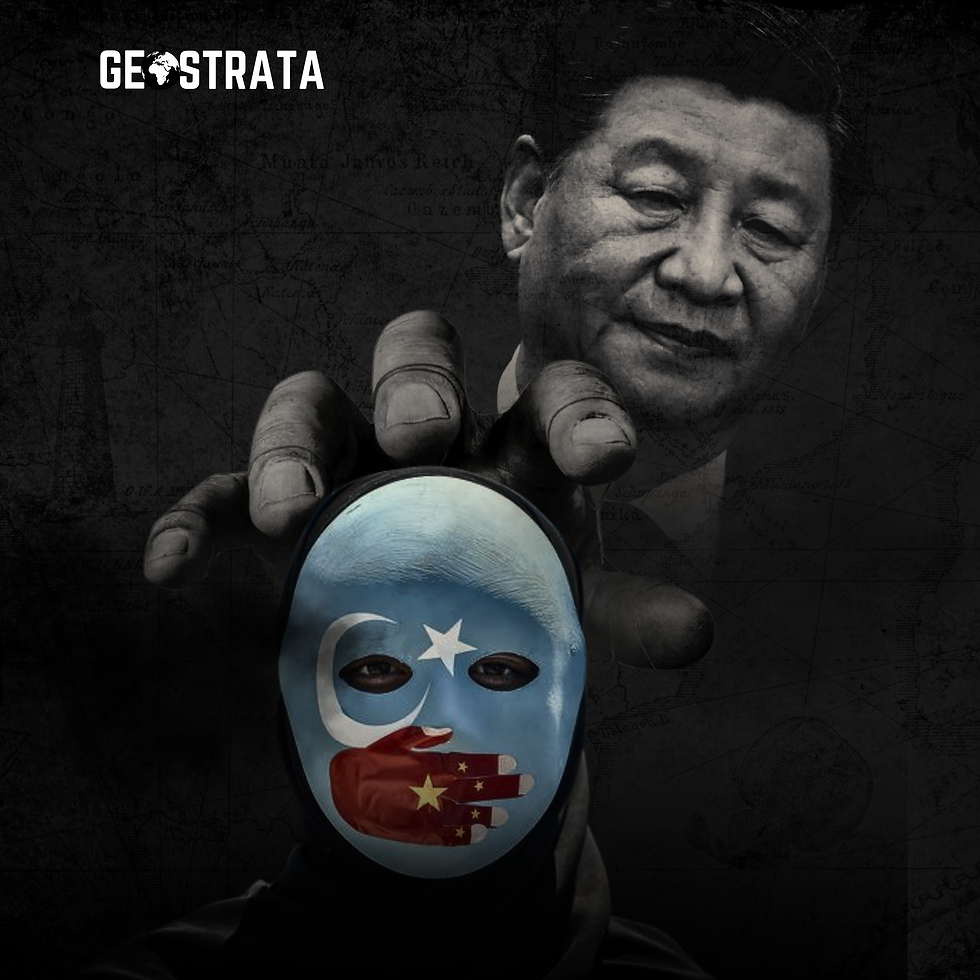Since 2014, the Chinese Communist Party (CCP) has committed various human rights violations in the form of a ‘Strike Hard Campaign Against Terrorism’ in the Xinjiang Autonomous Regions, thereby targeting Uyghur and other Turkic Muslim minority groups.

Cover by The Geostrata
Since then, there have been numerous reports exposing the conditions Uyghurs face in the mass internment camps like forced labour, and severe repression of their cultural and religious practice, all of which are orchestrated by the state.
While these human rights violations have drawn international attention, the plight of Uyghur Muslim women remains significantly underreported. This lack of focus risks obscuring the cases of unique and targeted abuse of Uyghur women within the broader human rights prism.
The hijab, a religious garment deeply rooted in Islam, is generally protected under human rights law through the right to freedom of religion, with any government limitations justified only by clear and compelling concerns for public safety.
In Xinjiang, however, China has prohibited the use of veils as part of their ‘anti-extremism’ regulation, which includes banning public services such as boarding buses for those who fail to abide by it. State-sponsored campaigns, such as the ‘ Project Beauty’ launched in 2011, encourage Uyghur Muslim women to shun the practice of niqab and jilbab, which signifies a broader effort by the CCP to erode Uyghur cultural and religious identity by a process of active Sinicization.
This intent is further emphasised by Xinjiang’s Communist Party officials in 2024, stating that this Sinicization of Islam is inevitable, thereby framing it as a need to assimilate Uyghur Muslims into the dominant Han Chinese culture. Beyond forced assimilation, Uyghur women face numerous other human rights abuses by the state actors.
The CCP employs draconian measures such as Intrauterine Device ( IUD) insertion, abortions and sterilization to curb the Uyghur population in the region, measures that starkly contrast with policies encouraging the country’s dominant Han culture to have more children.
According to a report by scholar Adrian Zenz, the population in the Xinjiang region plummeted by 84% between 2015 and 2018. Despite the region accounting for just 1.8 % of China’s population, the area experienced 80% of all IUD use in 2018.
In contrast with the fact that in the same period, the use of IUDs across the rest of China significantly declined. The report by Zenz also revealed that these population control measures were backed by punitive measures such as extrajudicial internment in training camps designed especially for the Uyghur Muslims. Defiance by the Uyghur Muslims is reported as the most common reason for internment.
This state-orchestrated assault is an attempt to control and manipulate their reproductive rights and body autonomy by coercion to subvert Uyghur identity and pursue the state’s political agenda. These detention camps have been a place of inflicting violence upon their bodies. They are subjected to forced IUDs and injections that temporarily cause the loss of menstrual cycles. Many of these instances have led to the indications of unnatural death in the detention camps.
The imposition of birth control pills as a prerequisite among the detained women for conjugal visits and accessing essential services such as taking a shower, towels and two hours in a bedroom reveals a deliberate and invasive control over the reproductive health of the women and a severe violation of fundamental human rights.
Moreover, the role of media can be emphasised in CCP's attempt to psychologically tamper in favour of making demographic changes among Uyghur.
In the detention centres, they make them attend lectures and films screened showing impoverished women struggling to feed their children. These detention camps have also been the site of constant and systemic sexual abuses, which included policemen, officials and outsiders who paid for their time with the ‘prettiest girl’.
Reports from the BBC describe the use of electrified sticks inserted into women, gang rapes and taking the women into rooms with no surveillance cameras installed, representing a blatant and egregious violation of their human rights.
These women are also forced by the guards to smear chilli pepper mixed liquid into their genitals, highlighting extreme brutality and dehumanisation perpetrated among the Uyghur women detainees. The presence of state actors underscores the institutional nature of the crime, which China has been refusing that such allegations persist despite mounting evidence.
These atrocities demand global attention to address the distinguished crimes inflicted on women.
CONCLUSION
Women are disproportionately prone to human rights violations, particularly in situations of conflicts, repression and systemic discrimination. Their vulnerability is further amplified due to their status in society, which makes them an easy target of specific and distinguished forms of abuse that exploit both their social and biological capacities.
The conditions of Uyghur women portray a similar situation, with the state being the perpetrator and exploiter of their status as women belonging to a minority community in China.
In light of these pervasive state-sponsored abuses, the critical question arises: How can we hold governments worldwide accountable for inflicting crimes against vulnerable minority groups, especially when agents of the state themselves perpetuate these violations?
BY SIBANI CHOUDHURY
TEAM GEOSTRATA
.png)
Important analysis